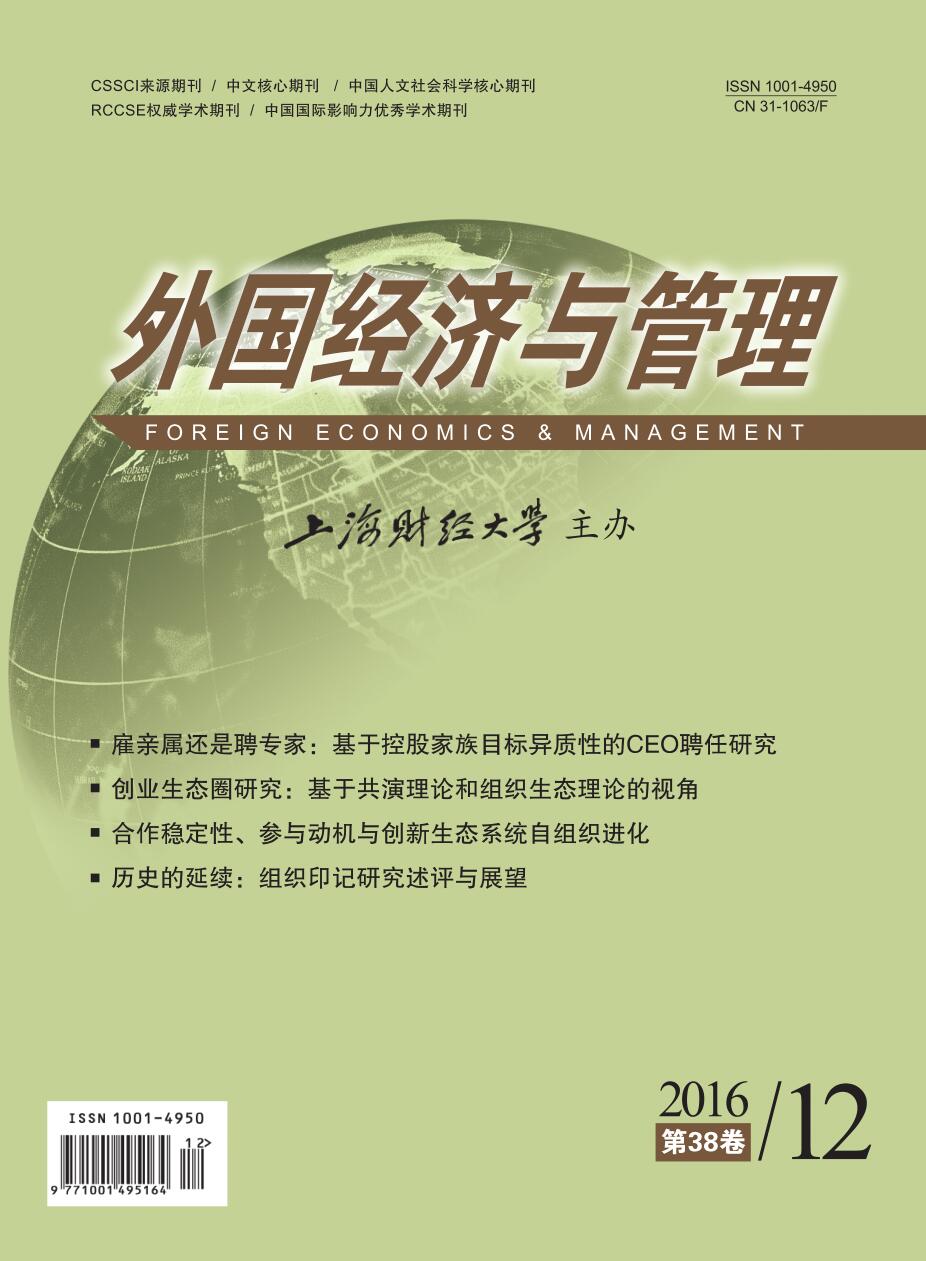随着环境不确定性的增加,组织惰性日益成为组织理论研究的热点问题,然而学术界对组织惰性的理解存在明显分歧。通过文献梳理发现,不同视角对组织惰性研究的逻辑起点不同以及组织惰性本身的复杂性是导致分歧的主要原因。基于系统性审查方法,搜集整理近40年来国内外组织惰性研究文献后,本文选取79篇英文文献和24篇中文文献,以环境选择和组织适应两类视角及其融合为主线,对组织惰性的概念构成与测量、前因和后果等方面进行了系统地梳理与述评,最后指出现有研究存在的不足和未来的研究方向。本文对组织惰性研究成果进行系统性梳理在国内外尚属首次,可为推动理论与实证研究的深入展开提供依据。
组织惰性:成功的副产品,抑或组织病症?——基于系统性审查方法的述评与展望
摘要
参考文献
10 Agle B R, Nagarajan N J, Sonnenfeld S A, et al. Does CEO charisma matter? An empirical analysis of the relationships among organizational performance, environmental uncertainty, and top management team perceptions of CEO charisma[J]. Academy of Management Journal, 2006, 49(1):161-174. DOI:10.5465/AMJ.2006.20785800
11 Allcorn S, Godkin L. Workplace psychodynamics and the management of organizational inertia[J]. Competitiveness Review:An International Business Journal, 2011, 21(1):89-104. DOI:10.1108/10595421111106247
12 Chen C A. Revisiting organizational age, inertia, and adaptability:Developing and testing a multi-stage model in the nonprofit sector[J]. Journal of Organizational Change Management, 2014, 27(2):251-272. DOI:10.1108/JOCM-10-2012-0166
13 Collinson S, Wilson D C. Inertia in Japanese organizations:Knowledge management routines and failure to innovate[J]. Organization Studies, 2006, 27(9):1359-1387. DOI:10.1177/0170840606067248
15 Feldman M S, Pentland B T. Reconceptualizing organizational routines as a source of flexibility and change[J]. Administrative Science Quarterly, 2003, 48(1):94-118. DOI:10.2307/3556620
16 Godkin L. The zone of inertia:Absorptive capacity and organizational change[J]. The Learning Organization:An International Journal, 2010, 17(3):196-207. DOI:10.1108/09696471011034900
17 Godkin L, Allcorn S. Overcoming organizational inertia:A tripartite model for achieving strategic organizational change[J]. Journal of Applied Business and Economics, 2008, 8(1):82-94.
19 Huang H C, Lai M C, Lin L H, et al. Overcoming organizational inertia to strengthen business model innovation:An open innovation perspective[J]. Journal of Organizational Change Management, 2013, 26(6):977-1002. DOI:10.1108/JOCM-04-2012-0047
20 Heine K, Rindfleisch H. Organizational decline:A synthesis of insights from organizational ecology, path dependence and the resource-based view[J]. Journal of Organizational Change Management, 2013, 26(1):8-28. DOI:10.1108/09534811311307888
21 König A, Schulte M, Enders A. Inertia in response to non-paradigmatic change:The case of meta-organizations[J]. Research Policy, 2012, 41(8):1325-1343. DOI:10.1016/j.respol.2012.03.006
22 Liao S H. Problem solving and knowledge inertia[J]. Expert Systems with Applications, 2002, 22(1):21-31. DOI:10.1016/S0957-4174(01)00046-X
23 Liao S H, Fei W C, Liu C T. Relationships between knowledge inertia, organizational learning and organization innovation[J]. Technovation, 2008, 28(4):183-195. DOI:10.1016/j.technovation.2007.11.005
24 Nedzinskas Š, Pundzienė A, Buožiūtė-Rafanavičienė S, et al. The impact of dynamic capabilities on SME performance in a volatile environment as moderated by organizational inertia[J]. Baltic Journal of Management, 2013, 8(4):376-396. DOI:10.1108/BJM-01-2013-0003
25 Polites G L, Karahanna E. Shackled to the status quo:The inhibiting effects of incumbent system habit, switching costs, and inertia on new system acceptance[J]. MIS Quarterly, 2012, 36(1):21-42.
26 Rawley E. Diversification, coordination costs, and organizational rigidity:Evidence from microdata[J]. Strategic Management Journal, 2010, 31(8):873-891.
27 Schwarz G M. The logic of deliberate structural inertia[J]. Journal of Management, 2012, 38(2):547-572. DOI:10.1177/0149206309361206
28 Soltwisch B W. The paradox of organizational rigidity:A contingency model for information processing during times of opportunity and threat[J]. Journal of Leadership & Organizational Studies, 2015, 22(4):395-403.
29 Sydow J, Schreyögg G, Koch J. Organizational path dependence:Opening the black box[J]. Academy of Management Review, 2009, 34(4):689-709. DOI:10.5465/AMR.2009.44885978
30 Zhou Z, Chen Z G. Formation mechanism of knowledge rigidity in firms[J]. Journal of Knowledge Management, 2011, 15(5):820-835. DOI:10.1108/13673271111174348
引用本文
白景坤, 荀婷, 张贞贞. 组织惰性:成功的副产品,抑或组织病症?——基于系统性审查方法的述评与展望[J]. 外国经济与管理, 2016, 38(12): 113–128.
导出参考文献,格式为:
上一篇:道义公平研究述评与展望






 9505
9505  9249
9249

